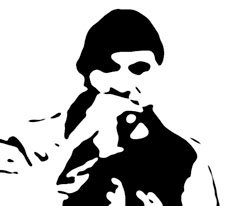Palestinian resistance can be summed up in one word, summud.
On Friday night Musa ran into the internet center we use to write reports and share our notes on the occupation with the world we know. He seemed out of breath. He had just received a call from an old man, who lived with his families in caves, detailing a terrorizing experience with settlers that occurred a few hours before. Earlier that day a group of settlers rode into town, we are not clear what they did, but the families were frightened and requested some Internationals come and spend the night to confront and document the terrorism.
Without much preparation, three of us were sent with camcorders and digital cameras to spend a night in Qawawis, a phantom of a village with only about three families, to be present if settlers decided to return in the middle of the night. We went willingly with heavy hearts and with wobbly knees.
Thirty minutes down the highway, past Hebron, our ride turned left and went off the road and into the darkness. There were no signs welcoming us to Qawawis, there was no electricity . Just a foggy darkness and our trust in our local coordinators. A few steps across moonlit rocks and thorny brush, we met an old man. His name was Hajj Ibrahim. In the middle of the darkness, two old men and a handful of women shuffled to and fro along with some shebab. We were given the choice of staying indoors, in a storage constructed out of rocks and cement with a heavy fabric roof, or on the roof of a cement two room house noone seemed to sleep in. We weren't feeling daring so we chose the indoor accomodations. They turned on our gas lamp and promised to knock loudly if the settlers arrived in the middle of the night. Within minutes, after taking in the starry night, we were sound asleep.
When we woke up in the morning, our biggest fear was that settlers came and we had done nothing. Our fears were laid to rest with a knock on the door. Hajj Ibrahim wanted us to say hello to Hajj Mahmoud and the rest of the residents. We had breakfast and met with the shebab who spoke more English than we did Arabic.
They showed us where settlers had rode in on tractors and introduced us to the sheep who have survived stone attacks at the hands of local settlers. In these parts the settlements are trailor park outposts and not the more developed and architecturally uniformed gated communities. Settlers are more like cowboys on the frontier in these parts. Life is more rugged in these parts.
Although many Palestinians have been forced to leave their homes since Al-Nakba, the boldest of the bold continue to hold on. The folks we were with live in some ways like Bedouins. Qawawis is their home and they would not be removed by settlers employing terrorism. This defiance, this determination to stay put, this steadfastness is summud.
Monday, July 17, 2006
Subscribe to:
Post Comments (Atom)

1 comment:
Keep up the good work, stay safe.
Post a Comment